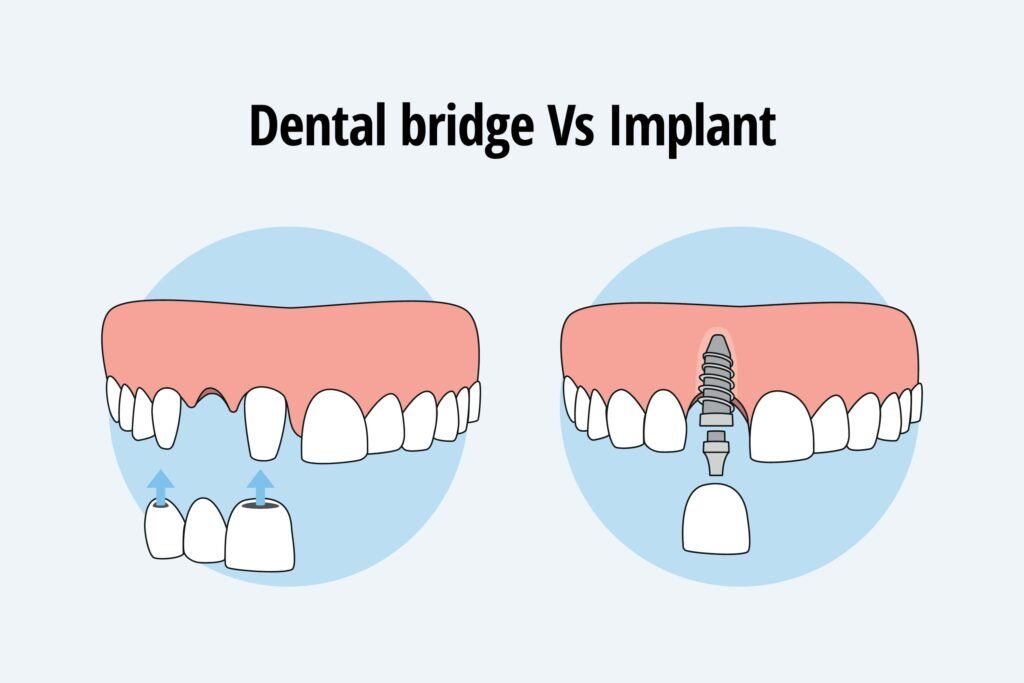General Comparison
Difference Between Dental Implant and Bridge

Difference Between Dental Implant and Bridge
General Comparison:
Both dental implants and bridges are considered cosmetic and restorative dental treatments that address issues such as tooth decay, damage to the roots, etc. They serve as durable replacements for missing teeth. However, the primary difference lies in their approach:
- Dental Implant Focus: The focus of dental implantation is solely on the missing tooth. All stages of implant placement are dedicated to integrating the implant fixture into the jawbone, mimicking the function and appearance of a natural tooth.
- Bridge Involvement: In contrast, a dental bridge involves neighboring teeth in its placement. The adjacent teeth are prepared by reshaping them, and they serve as anchors for the bridge, which fills the gap left by the missing tooth.
Dental Implant:
What is a Dental Implant?
A dental implant is a permanent replacement for missing teeth. It comprises components such as the fixture, abutment, crown, and prosthetic covering. These components work together to create a structure resembling a natural tooth, allowing the patient to fill the gap left by the missing tooth seamlessly. Dental implants function similarly to natural teeth, facilitating activities like chewing and speaking.
Dental Bridge:
What is a Dental Bridge?
A dental bridge, also known as a tooth bridge, revitalizes the appearance and function of a missing tooth by creating a bridge-like structure. It utilizes neighboring teeth to support the prosthetic tooth. In this process, the adjacent teeth are reshaped and fitted with crowns, serving as anchors to hold the artificial tooth in place.
Differences in Procedure:
- Timeframe: The process of installing a bridge is generally shorter compared to dental implants. While immediate implants exist, other implant procedures typically take 2 to 6 months. Dental bridges usually require only two sessions.
- Surgical Involvement: Dental implantation involves a surgical procedure to place the implant fixture into the jawbone. Conversely, bridges do not require surgery. They rely on reshaping adjacent teeth and placing crowns without the need for implant fixtures within the jawbone.
In summary, while dental implants focus solely on the missing tooth and require surgical intervention, bridges involve neighboring teeth and do not necessitate implantation into the jawbone.
Lifespan of Dental Implants and Bridges
Dental Implant Lifespan:
Dental implants offer patients teeth that closely resemble natural ones, providing durability and longevity to the jawbone due to the high-quality titanium fixtures used. Additionally, they offer better adaptability to the gum and jawbone. Overall, dental implants can be considered a permanent solution with a long lifespan. The use of quality materials and the integration with natural bone and gum tissues contribute to their longevity.
Bridge Lifespan:
In contrast, dental bridges involve the use of crowns and engagement of adjacent teeth, which can increase the risk of decay. In the best-case scenario, the lifespan of a dental bridge is around 25 years, but in less favorable conditions, it may last around 10 years on average.
Ideal Candidates for Bridges:
The best candidates for dental bridges are individuals with only one missing tooth and adjacent teeth that are healthy but may have minor issues like fillings or minor decay. It's crucial to consult with a specialist before proceeding with a bridge, especially if the gap has been present for an extended period. Prolonged gaps can lead to gum and bone deterioration, potentially complicating future treatments like implants.
Ideal Candidates for Implants:
Dental implants are the preferred option for individuals with one or more missing teeth seeking a natural and permanent replacement. They provide a solution that closely mimics natural teeth, facilitating chewing and other functions without the challenges posed by artificial prosthetics.
Cost Difference:
Another significant difference between implants and bridges lies in their cost. Due to the complexity of the implantation process, implants tend to be more expensive than bridges. Additionally, bridges may require repairs over time, making implants a more cost-effective option in the long run. The cost of implants is typically spread across multiple stages of treatment, while bridge costs are paid upfront.
Conclusion
While we've aimed to provide a concise overview of the differences between implants and bridges, it's essential to consult with a specialized dentist for personalized advice. They can assess your oral health, the condition of your teeth and gums, and recommend the most suitable treatment option based on your individual circumstances.
